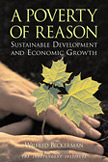|
Beckerman then addresses
more recent critics who acknowledge this paradigm, but nonetheless
argue that resource use must be curbed because of environmental
impacts such as loss of biodiversity and global warming. While not
denying the potential problems that might result from both
phenomenon, the economist suggests that much uncertainty still
surrounds these issues, that the costs of the measures proposed to
deal with both are massively out of line with their potential
benefits and that wealth creation will make it easier for future
generations to deal with these and other environmental problems.
The "precautionary
principle," whose strongest version would essentially prevent
technological change in the absence of full scientific certainty,
is the author's next target. According to Beckerman, proponents of
the precautionary principle often fail to recognize that new technologies
offer not only
potential problems but also important benefits. Indeed, had this
principle ever been taken seriously, humans would still be
dwelling in caves (and probably without fire) and leading
existences undoubtedly more solitary, poor, nasty, brutish and
short than present ones. In Beckerman's view, the precautionary
principle often boils
down to an injunction to take expensive actions regarding problems whose
severity is mostly uncertain and probably exaggerated (remember global
cooling?), once again harming the
poorest members of the current generation for the benefit of
future, and in all likelihood, richer individuals.
Beckerman concludes his
essay by pointing out that the greatest contribution we can make
to the welfare of future generations is to bequeath them a free
and democratic society by improving current respect for democratic
values and human rights. In other words, get the fundamental
incentives and institutions right, and both people and the
environment will be better off in the long run.
I highly recommend this
short book to any activist and academic who believes in the
necessity of the measures Beckerman attacks, but who might be
willing to entertain the idea that critiques of sustainable
development are not limited
to corporate shills, but also comprise some thoughtful
individuals.
|



